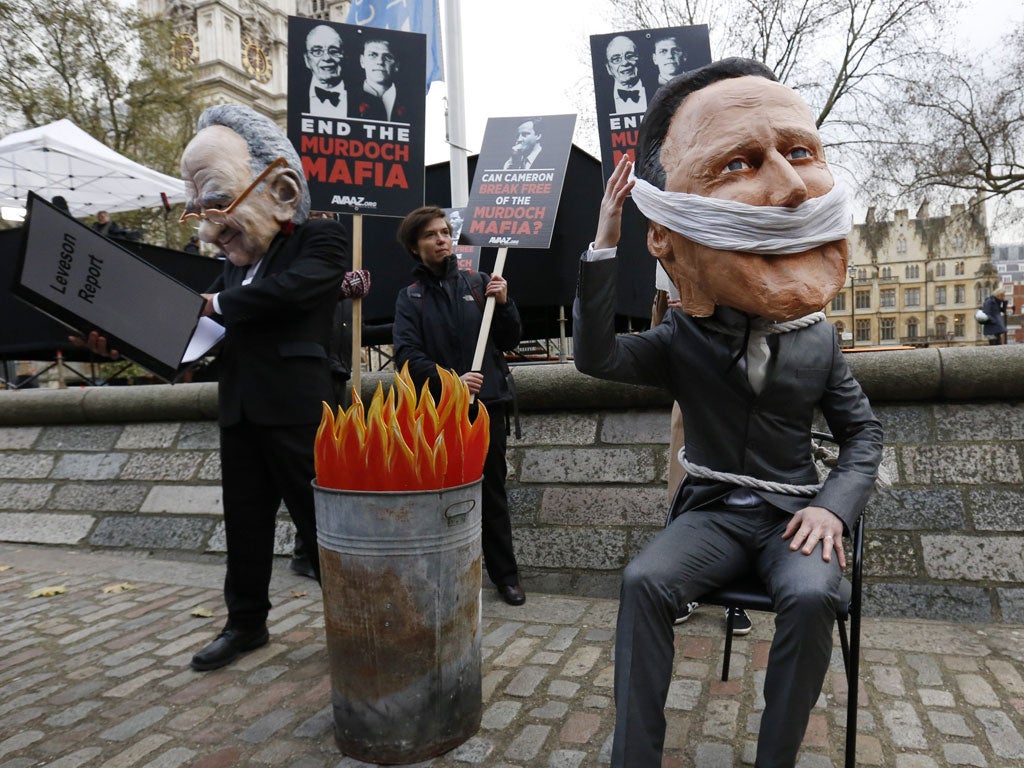Cameron discovers a principle as he fights for a free press
The Prime Minister's antipathy to press regulation sets him at odds with the other party leaders, but gives him an unusually decisive air


David Cameron reportedly told his aides "don't let me launch a public inquiry" when the story broke in July last year that Milly Dowler's mobile phone had been hacked by a News of the World journalist. He saw the dangers of being pushed by the emotion of public opinion into an inquiry that could only mean trouble for him and that would be irrelevant to phone hacking. How right he has proved to be. The hacking of the murdered teenager's voicemail was against the law. The right way of dealing with that upsetting offence was for Rupert Murdoch's company to compensate the Dowler family, as it did, paying them £2m, and for all journalists to learn that hacking voicemails was not a joke (Piers Morgan) or a "grey area" (other journalists at the time) but a crime.
That was why I mocked Ed Miliband when he called for a "full, independent public inquiry" into the whole business. I said that calling for a "Fipi" was the factory setting of the opposition politician. It was over the top, pointless and an attempt to capitalise on popular revulsion. It seemed cheap for the Labour leader to link the Dowler case with David Cameron's closeness to Murdoch and his people. Telling the Commons that "this is not the time for ... low blows", Miliband demanded that the Prime Minister "accept that he made a catastrophic judgement in bringing Andy Coulson into the heart of his Downing Street machine". Coulson was deputy editor of the News of the World at the time of the Dowler case.
So far, so cynical. Politics may be a noble calling but it does require a flat-faced ruthlessness at times. But then things changed, when Nick Clegg decided that a Fipi was what was needed. At this point, Cameron made what I thought was a mistake. He gave in. He may have calculated that he would be defeated in the Commons if Labour, the Liberal Democrats and the minor parties came together with the gale of moral outrage behind them. He would have been made to look terrible, and an inquiry would have been set up anyway.
As he now faces the prospect of being defeated by the same alignment of forces, at least some of the heat has dissipated, and he now has a hearing for his strong case against legislation to regulate the press. Mind you, it was interesting to observe last week as a fully formed principle emerged from the Prime Minister as he responded in the House to an inquiry report he hadn't wanted. It was a good performance, by someone who appeared to be completely on top of all the arguments.
What a change from someone whose greatest strengths had previously included not believing in very much. Someone who, I was told only a few weeks ago, had "not a clue" what to do about the report. Yet this is a familiar pattern; he is the essay-crisis Prime Minister. He is ideologically flexible, but once he has decided and thrown himself into his brief he becomes sure of himself and in command of the detail. I can see how he came to pose as the defender of free speech, although perhaps it helps that I agree with his newly expressed (or newly discovered) principle. I think that Lord Justice Leveson tried to reconcile the irreconcilable. Either you have a free press or you have a press regulated by an authority appointed by government. Leveson wanted to have the regulator "verified" by an authority appointed by government: he suggested Ofcom. But he failed to escape the inescapable: under his plan, Ed Richards, who once worked for Gordon Brown, and who was appointed head of Ofcom by the Government, would decide who regulates the press.
Cameron sees that this is "the Rubicon", the analogy he used last week. He probably even knows that it was the river crossed by Julius Caesar, who went on to become a dictator. But he also knows that Michael Gove's confident defence of press freedom at the Leveson inquiry went down well with parts of the press. And that the Daily Mail's 10-page attack on the inquiry two weeks ago, based on a trivial story about one of Leveson's advisers and straplined "The People Who Know Best", was an unsubtle hint.
He is at that happy confluence where principle and self-interest coincide. He wants the support of News International and the Mail titles, and standing up for freedom of expression gives him a shot at The Independent and The Independent on Sunday as well. (Even The Guardian had a leading article arguing against state regulation before it ran one on Thursday saying that it "may be necessary".)
He knew that an inquiry was a bad idea, and so it has proved. Cameron will always be known as the Prime Minister who rode Rebekah's borrowed police horse and who thought LOL stood for "lots of love", while the report failed to come up with anything that would have made any difference to phone-hacking, which was always illegal. Worse, it was written as if the internet did not exist.
Cameron now faces an elaborate struggle in Parliament, as Miliband and Clegg try to combine to embarrass him further. But it is not clear that they can legislate from half in and half out of government. And Cameron now knows what he believes.

Join our commenting forum
Join thought-provoking conversations, follow other Independent readers and see their replies